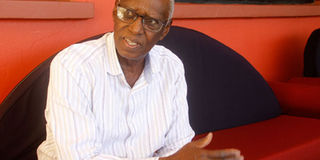Sectarianism, insecurity forced us to wage war against Obote

Perspective. Former minister Mathew Rukikaire during the interview in Kampala this week. PHOTO BY ABUBAKER LUBOWA
What you need to know:
Interview. On February 6, 1981, the National Resistance Army, now UPDF, launched an attack on Kabamba Barracks in Mubende District, marking the beginning of a five-year guerrilla war that brought President Museveni to power in 1986. Days before the attack, NRA fighters converged at the house of former minister Mathew Rukikaire in Makindye, Kampala, for final preparations of the attack. Risdel Kasasira talked to Rukikaire.
You participated in the planning and mobilisation of resources before the attack on Kabamba. What happened in your house on the day before the attack?
Actually, we shouldn’t focus so much on the day before the attack because these fighters came to this house in a group of two, three and sometimes four, over a period of about three days.
And they came with some weapons, adding more as and when they were collected. During that period, it was a question of assembling the fighters, cleaning weapons and preparing to get orders from Museveni and his other officers who were going to lead the attack on Kabamba.
These people who were here didn’t know what was going to happen. I’m sure that with a few exceptions, the majority of them didn’t know where they were going to attack, until they got into the truck which took them and on the way, I believe, they were informed that they were going to attack Kabamba.
Museveni on one occasion slept here and we have a room which we call Museveni’s Room. He also came before people started assembling here. Between him, myself and my wife, we had to decide that this venue could be used for that purpose. I still had a family here. All my children were here. The risk involved was heavy because at the time, there was a government and here was Rukikaire helping the rebels to launch a war against the government from his house.
Why take such a risk?
I believed that [president Milton] Obote had to go. If I didn’t, maybe somebody else would take it. And some of us were deeply convinced that Obote and those who preceded him like [Idi] Amin and so on had to be swept aside to create a new basis for new Uganda.
Had you known Museveni before?
Not too long in the respect of this particular adventure, but we were part of the UPM [Uganda Patriotic Movement that came after] the coalition or the Military Commission collapsed with [Paulo] Muwanga.
UPM was formed before [1980] elections to break the impasse which had developed. You had DP and UPC as sole political parties. But both of them had become terribly sectarian and Obote had moved into a position where he was relying more and more on the military. So, it was very clear that there was a strong probability that even DP who were supposed to be the majority, were going to lose the election.
Secondly, we didn’t want to get involved with either of the two political parties which were deeply sectarian. There was a third party called Kabaka Yekka which was more sectarian because it was not even national. It was only in Buganda.
Therefore, a decision was taken by young people, some of them who were still in school at Makerere. People like Bidandi Ssali, Kintu Musoke, [Kirunda] Kivejinja, even [Tumusiime] Mutebile though he was a public servant, he was part of it, [Amama] Mbabazi, [Ruhakana] Rugunda, people like the late [Sam] Njuba and his wife, and many others who converged and agreed to form a political party.
Mark you, we were not sure that we were going to win. But, it was a question of making a point and establishing a principle that a new force was born and it was not going to be swayed by the old politics of sectarianism and so on.
Going back to the day before the attack, what happened?
Museveni was here and the person who was second-in-command, Sam Magara. But the person who was here all the time was Elly Tumwine for the three days before the attack. He was the one in charge. Magara used to bring in fighters and go back to bring more. Museveni would come and go and also he slept here on the second night.
You mean February 5?
Yes. Like I said earlier, this was a clandestine mission, very few knew the plan. I sent the children, I think by bus, to Nairobi, Kenya. I remained here with my driver called Eric Byomuhangi from Muhanga, Kabale, who died several years ago. At that time, civilians were busy buying guns, not to attack government but protect themselves because there was too much insecurity at that time. I had a machine gun, AK47 and a pistol. I didn’t want to be attacked and gunned down with my family without putting up a fight.
Where did you put these guns?
I gave the machine gun to Museveni the first day he came and gave the pistol to Andrew Lutaya.
What did you talk about that night with Museveni?
That was a clandestine move. I wouldn’t want to go into those details. But what I should add is that after they had left, I also had to leave this house because we were not sure that the government forces would not find out where they had left from. I had to leave and take cover. Museveni later sent me a message that I should find a way to leave the country and go to Nairobi and help to organise external support, which I did. But not immediately.
Museveni says there was a meeting before the attack in this house. Didn’t you discuss the planned attack?
The issue of what time they were going and who was going to lead the convoy was between him and the fighters. It was Tumwine and Magara who were involved. But they had to be fed. They cooked for themselves with the help of my driver because we made sure that nobody could come here and nobody could go out, except those who were involved like Museveni and Magara. In my case, though I could go out and come back. For those three days, I didn’t go out.
Rukikaire’s Take on key issues
Meeting Museveni
After the Moshi Conference, even though I didn’t attend it because I was still working with Shell International, we were supporting the forces that got rid of Amin.
What he said in his speech [during Rukikaire’s 80th birthday and 50 years of holy matrimony on December 16, 2018] is something I didn’t know that while I was at King’s College Budo and he was at Ntare, they came as a sports team to compete and he said he remembers me competing in high jump. He has a good memory.
But he also remembered that when I was at Makerere [University] as a student, and he was still a student at Ntare and because they had a shortage of teachers at Ntare, I used to go and teach. So I taught him. He even remembers that I was the first person to describe to them what a human cell is. So, the long and short of it, we had known each other before.
Also, during the Lule’s government in which he was minister of Defence, before Lule was overthrown, although I was in Nairobi, I had been appointed by Lule as deputy minister for Agriculture two days before he was overthrown and the Military Commission took over.
On relationship with Museveni
President Museveni is still my friend. There could be differences on policies. But we get along. I’m an elder. I’m older than him. He can listen to me more than some of his close colleagues in government because I have retired and I don’t expect or want to be redeployed. So, you are lucky to have a man like Rukikaire.




